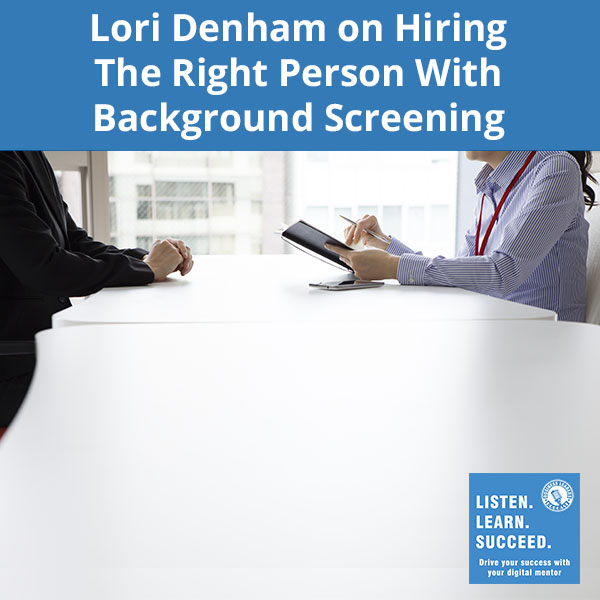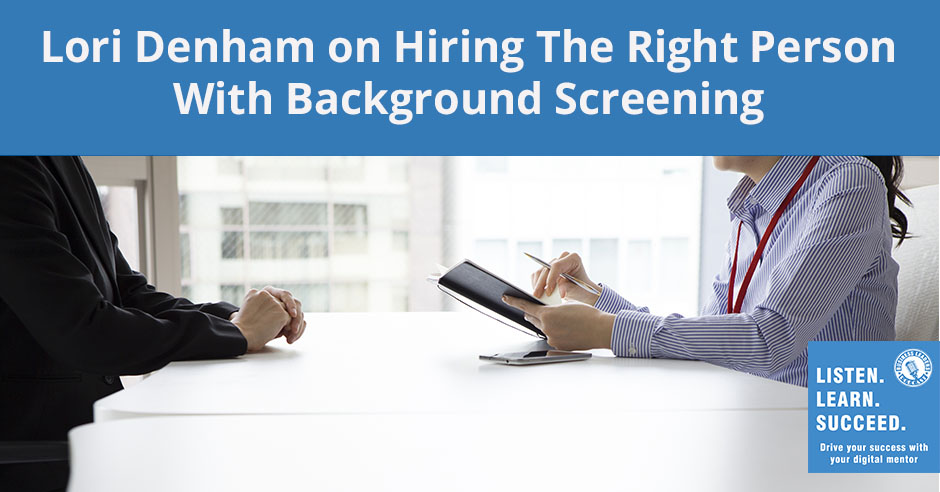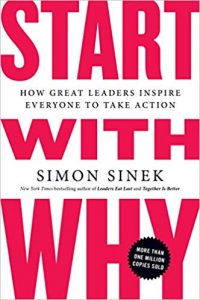Lori Denham on Hiring The Right Person With Background Screening


Hiring somebody could either break or make the company. There has to be an assurance that the person you hire is someone who they say they are. You have to go through a number of credentials and background checks to ensure their honesty and to know whether they can deliver well for the job. It helps to hire the right person in the first place, though this can be tough to do. Lori Denham is the founder of Guardian Background Screening, a full-service background screening company. Lori has all the details when it comes to doing pre and post-employment background checks. She takes us down into the processes as well as provides some notes and advice on the necessity of undergoing through the screening.
Lori Denham on Hiring The Right Person With Background Screening
We have Laura Denham on the show. She’s the Founder of Guardian Background Screening. Laura, thanks so much for being here.
Thanks for having me, Bob.
Tell me a little bit about your business and who you serve.
We are a full-service background screening company. We do pre and post-employment background checks. We do tenant checks, volunteer background screening, drug screening, aptitude and integrity testing.
Is there a requirement to do those types of testing now in the workplace?
No. However, the aptitude and integrity testing for the small business owner is a way to figure out if this person is going to be a good fit. Are they going to waste time on the computers? Do they have abusive tendencies? Do they have leadership potential? This is an affordable non-DISC way for small business owners to get that information.
Circling back to the background checks and other services that you provide for the business owner, you also work with nonprofits. Is it mandated that you do?
None of it is mandated for me.
I had a clearance way back in the military. To serve in my field, I had to have a clearance.
That depends on where you want to work. Obviously, in the military or government, there is a requirement. Any local government, there’s typically background screening required.
For the rest of the world, it’s a voluntary elective pursuit. When a business engages you to do a background or any of the services that you provide, what’s the general motivation of that business owner? What’s the typical benefit to them?
They are looking to trust the person they’re hiring and make sure there’s nothing lurking in the background that’s going to be a surprise down the road. Perhaps they work with vulnerable populations or sensitive information, and they want to make sure that the person they’re hiring is not going to take advantage of either of those situations. Whether it be abuse, neglect and maybe they don’t have the credentials that they said they had. It’s a high-fraud area of resumes, saying that they’ve graduated with degrees or have had jobs that they’ve never done. For the employer, I’m ensuring that who they’re hiring is who they say they are.
As an applicant, I said I went to Vanderbilt and I put that on my resume. There’s some database that you go to verify. Is that available to everybody? How does the data retrieval to verify work?
Yes and no. There are a lot of colleges or schools that have stored their information with a vendor who then charges us to retrieve it. If they don’t use that service, then anybody can call the registrar’s office. Sometimes they have to pay for that verification, sometimes they don’t. It depends on what level of education they have. It’s to make sure that you’ve graduated with either the diploma or the degree that you’ve said you’ve graduated with.
What set you on this track to start this business?
When we moved back to Colorado, I had my life and health insurance license and I did not want to keep that up. I didn’t enjoy the industry at all. I fell into background screening and learned it from the operations up and got hooked on the compliance. I got hooked on serving nonprofits, churches, youth, and camp, and understanding that they couldn’t afford to protect and that’s where predators come in.
Unfortunately, there’s been a great deal of press recently about past abuse. If I’m an at-risk group, whether it’s a nonprofit or camp or at-risk youth, what’s their motivation when they come and use your service?
 Background Screening: The motivation of our clients is to potentially protect their reputation.
Background Screening: The motivation of our clients is to potentially protect their reputation.
The motivation is most of their people are not staff. They’re usually volunteers, which is the other loophole that predators take advantage of. The motivation of our clients is to potentially protect the reputation. They’ve built this organization for a purpose. Whether it be a church or a ministry or a nonprofit, somebody built this. It only takes one instance to throw it all away or have a marketing nightmare. Most of those organizations don’t have the funds to turn that around. That means their door shut. They lose donors and clients, whatever that case may be. The motivation is to help them weed out those potential risks. It doesn’t mean that a volunteer may not be able to work with that organization because all of them have hearts, but perhaps there’s a better place for them to volunteer. It’s not with the vulnerable population or intellectual property or bank accounts. It helps them evaluate.
Folks may think that it’s about them protecting their reputation, but at the end of the day, it’s about protecting those kids and that at-risk population.
That’s where my heart lies, making sure that we weed out as much risk as possible.
You do some special projects when you’re working with nonprofits. Let’s dig into that a little bit.
Most of the time, nonprofits cannot afford to do a proper background check. I get in there and work with them as far as, “Who do you work with? What types of staff or volunteer come into work with your clients? Does your insurance company require anything?” Are there some requirements you have to cover? Are there requirements in your safety policy that you need to cover? Let’s try to get as much of that covered through background checks as you can. Those cost a lot if you do an absolute top-notch background check, you could run into hundreds of dollars.
We work with a plan that gets them the best coverage. Sometimes it means that the applicant’s paying for that background check, sometimes it could be a split. Sometimes it’s cost effective enough for the nonprofit to take on the fee itself. Once that happens, any services that those nonprofits purchased through us, we revenue share 5% back to them. It becomes another stream of income. We go above and beyond protecting them to also creating a revenue stream for them.
If you go through a background check for your population of employees, that stays the same. Let’s say somehow, they go, “Did you know?” “No, I didn’t. It didn’t show up. Why?” There are some bits of information that doesn’t show up, why is that?
There are probably well over 1,200, 1,300 consumer reporting agencies, which is what we are. Every one of us interprets the Fair Credit Reporting Act differently. Our interpretation coupled with our attorney’s recommendations for how we report and follow determines what shows up on a background check. For instance, the standard is a seven-year look back reporting everything. There are some agencies who will only report convictions. If they were arrested last year, it wouldn’t show up on the report because it wasn’t a conviction. It also depends on that state’s laws that have been grandfathered into the Fair Credit Reporting Act and that’s who governs us. It all boils down to interpretation and the consumer reporting agencies’ tolerance for risk.
From the benefit to the employer that goes down this road that says, “I’m going to make it part of my budget to make sure that I’m protecting my customer and employee base,” are you finding greater acceptance or more pushback?
There are far more acceptance these days. However, in our State of Colorado with recreational marijuana, I’ve seen a lot of employers pull back parts of the drug screening. They would much rather not know that THC is showing up and only test for that post-accident. That’s where I’ve seen the turn. Unfortunately, in Colorado, the unemployment rate being so low, there’s a feeling of lack for filling those open positions.
When they do the background screening, CBD doesn’t show up at all?
If they’ve been arrested for it.
When you’re working with an organization and the employees know that they’re going through a background check, what’s the typical reaction from the employee that’s having the background check?
Most of them know it was commonplace. If they know there’s a drug screening on top of that, you may see them accept the position but not go through with it because now they know they have to go through a drug screening. The applicants know that it’s industry standard. I don’t see a whole lot of pushback. I see a lot of, “I had a background screening done over here. Can’t they use that?” No, because when you signed your authorization, the authorization was for that company to do that.
Start with a why.
You’ve been in business for how long?
We are about a year and a half old now, but I’ve been in the industry almost four.
You were working in the background. Take me to that thought process when you’re going, “I’m going to do this myself.” What was that dialogue?
It became a passion when I saw that I loved the compliance. I loved educating the organizations who typically can’t afford good risk mitigation. I found a way to add my philanthropy to it. Other business owners aren’t excited about giving theirs away, so I thought this was a perfect way for me to put the teacher out there, have a viable business educating my clients, and also be able to give back and make a difference in the community.
You have the requisite background skills and tax ID. You’ve gone through all the fun stuff. Looking back at the first series of steps that you took over the first three or four months, what were those like?
A little chaotic, especially mentally because your brain’s going, “Did I do this? Did I check that off? What’s first?” I stopped, got a calendar out and I went, “Let’s get my name out there. How do I do that?” I started with a lot of networking. I did a couple of expos. One was a soft launch in a market that I lived in for twenty years back in Reno. I could see what kind of questions we would get, what kind of feedback, who’s going to stop and is there an interest? That was a great way for me to get some marketing underneath my belt in a test market. I came back here and did a women’s expo. That was incredibly successful. I still have three or four clients from that that I did. That taught me that industry-specific expos were the best way for me to meet, have a great conversation, let people ask questions, and then follow-up. I created a social media marketing plan as well. I have contracted a social media manager to help me stay on top of that. This will be very good for her to integrate into our system.
At the end of the first six or eight months, did you meet your goal on clients?
I would say I’m still shy of that, but what I had was a lot of solid information of what worked and what didn’t work. What worked best was the face-to-face, the personal networking and follow-up. I’m not a pushy salesperson, I’m more of, “Let me educate you whether you use my service or not. At least I’m out there and I’m happy to answer any questions that you have.” I always take something positive from it. I either learn or I win. I like the winning part. That’s how I looked at all those, not as failures but. “I gathered a lot more information from that. I now know not to do that.” You had sent me a great question that made me think about what was something that I absolutely said yes to that I should have said yes to. One of that was too early on, I signed on a lead generating company. They were very excited to work with me because I did not have a typical message because of my give back. Would I do it? Yes, probably later. Not as soon as I had brought that into my organization. That was an expense that I haven’t recovered yet, but a great learning one at the same time.
 Background Screening: Take something positive from any situation. You either learn or you win.
Background Screening: Take something positive from any situation. You either learn or you win.
What does your prototypical client look like?
Typically, our nonprofits are established, whether that be a church, nonprofit, faith-based ministry or youth camps. They have been established and they’ve got three-plus years probably under their belt. They have well over 50 volunteers. The staff can fluctuate between five plus, but it’s heavily volunteering. I work with them to not only background check their volunteer but have a recheck program. If your volunteers know they are being rechecked, another loop has closed for those potential predators to pop into your organization.
Let’s say on the nonprofit, I’ve got 50 people that I want to take in and use your services for. What should I anticipate the range of expense?
In Colorado, I offer a $16 nonprofit pricing. That gets them their database search, that gives them their sex offender registry search of all states, and it also gives them a State of Colorado report. The reason that is important here in Colorado is most of our counties do not report into that database search.
Let’s say there’s a Board of Advisors in that nonprofit, what’s the board’s reaction to the service and the expense?
It’s either, “That’s all you’re charging? Or what’s missing?” I’ve purposely priced my services for these organizations because they’re underserved. I believe they need to get as much protection for those children or vulnerable populations as they can. Most of it is a shock.
Let’s say I’m that organization, I’ve got my 50 volunteers for this year. We go through the process and we are sitting here and then we start a new year. Is there a protocol where they redo it every year or every quarter?
That’s where we talk about their safety policy. I don’t write the safety policy, but I help them with the questions. I have a link that I send them. There is an organization out there that publishes a great safety policy as a template. We put something into writing that says, “If you’re working with kids, you’re going to be rechecked every year, two years.” Two years is probably as long as I would go. If they’re working with the organization’s finances, I would make sure we were doing at least annual checks especially on the credit or civil where we can see if there’s any miss going on.
I don’t know if you’ve been in the circumstance when you’re talking about the board where they have their legal counsel there. I would be interested to hear about the reaction when you’re sitting there, and legal counsel is opining away. What do they say typically?
They don’t say much until I’m gone. That’s mostly because they’re mulling over the conversation or perhaps that organization didn’t think through the safety policy and their liability. Some of them bring on other organizations to do the volunteer work. If they don’t background check those organizations and something happens through that onsite visit, on your behalf, that’s still your name. They don’t think about the liability that happens even if you use an outsourced volunteer base. They’re silenced because they haven’t thought through the whole process.
That’s a whole lot better than the expense and embarrassment. Maybe you don’t get them all, but you at least avoid the obvious.
We’re not going to catch every one of them but if something happens, and if you’re brought to court and you can show that you have all these policies and safety procedures in place and you’re following them and not making exceptions, then you’re going to fare better in that legal setting than the, “I wasn’t aware. I didn’t do it.”
Given the world of information that we live in, what’s the biggest pushback why they don’t do it?
It boils down to money.
In my mind, that’s an inexpensive deductible.
It is but when you’re nonprofit, whether you’re a church or a plain nonprofit, it boils down to not budgeting for that protection.
Learn by doing.
It seemed to me if you had a nonprofit organization with kids, parents would GoFundMe that in a hurry.
My perception and opinion are the pushback usually boil down to funding. One of my clients did up their budget after talking with me. They didn’t have to up it a lot, but when they realized they were not getting the coverage they thought they were getting, that sent them into a little bit of a panic, the fact that they weren’t being compliant with some of their stuff and not keeping things under lock and key.
The parents that have had their children go into these nonprofits, are they aware whether background checks are done in that organization or not?
Sometimes yes, but mostly no.
As a parent, I’d be interested. I would feel at some level better knowing that that was in place. If I’m the parent out there and I’ve got kids in any of the nonprofit space, what’s the question I should ask? Who should I ask it to as to whether there’s background information in diligence being done?
Your managers there should know. If not, your executive director should be able to tell you if background checks are being done and who they’re being done on. I happened to know there’s a school district in Colorado that does not do background checks unless it is federally mandated. It’s because they are big and it’s too costly. I have nothing to say other than talk to me.
What if the folks are in Texas or somewhere else besides here, can you do what you do nationwide?
Yes, we can even do international. There are a lot more hoops for some countries and they’re not very instant. In some cases, they could be months long. Internationals aren’t as common, but we can do them.
If I was that hypothetical nonprofit and I’ve got 50 folks that I want you to run through the hoops, what’s the typical timeframe from beginning to end for deliverable?
Most results happen within 24 hours. Depending on the level of background check they’re doing, it could take 48 hours. If there’s some validation that needs to be done, it could take three to five business days, sometimes longer. It depends on the county that we have to research. Typically, they’re getting the information back in 24 hours.
For the folks that are on the edge of their seat, how do they find you?
Our website is GuardianBackgroundScreening.com. We can be found on Facebook and Twitter @Guardian12081. We are Guardian Background Screening, LLC on LinkedIn.
The only mistake that these folks can make is if they don’t call. We’re going to shift gears just a little bit. As you go through your business career, many entrepreneurs are influenced by a book of one kind or another. Is there an influential book that has altered your perception of being a founder of your business?
 Start with Why: How Great Leaders Inspire Everyone to Take Action
Start with Why: How Great Leaders Inspire Everyone to Take Action
Yes. I like the book by Simon Sinek, Start with Why. He did that as a TED Talk, so I didn’t even know there was a book. He had a YouTube video on Start with the Why and that stuck with me. I have built my company and my culture on my why. That’s making a difference, protecting the vulnerable populations, community service and giving back.
Looking back over the past period of time, we’re running this thing so it doesn’t exactly look like success. I was reminded that same failure was not a positive way to characterize that. In looking at failure, do you look back to where there was one rough patch that serves you well in going to the next level?
I started out my company already having all the connections I needed in the industry. I was asked why I started as a reseller versus a consumer reporting agency. I had my reasons. Looking back, I should have pulled the trigger from the very beginning. It took me a couple more months to make that transition by pulling all the vendors back together and the platform and reorganizing. That was learning by doing.
If you could put an ad out on the local paper on page one, sharing your message, what would it say and why?
No one wants to see a child get hurt or injured. Let us help you mitigate your risk with proper background checks for your staff and volunteers.
One would think, back to the ongoing litany of stuff that’s on the news, that you would stick out as an anomaly if you weren’t doing this. The kids are marked forever if you don’t. Looking back over the past period of time, starting the company, what was the best allocation of either your time or an initiative that helped you the most?
Definitely, the industry-specific expos, being able to speak with your end-user right up front, building that relationship right off the bat.
When you say industry-specific, are you saying that you went to another security industry or no?
I’ll be more specific, like Women’s Business Owner Conference. I’m going to church camps and conference expo. That is industry-specific. Putting me in front of those decision makers and having the ability to answer their questions. When you meet with somebody and you can talk and be able to answer those questions, the relationship may not produce a business transaction at that moment, but they remember talking to you. When they’re ready, they reach back out because they remember it’s going to help them. It’s the people business.
If I were to pry into your group of folks that know you best, what is your most unusual habit and what others may consider out of the ordinary? How’s it helped your business or company?
My brain does not turn off. My downtime to keep myself away from the business so that I can process ideas, I have quiet time, but I also have a video game where my fingers are pushing things, but my brain is going a mile a minute. Once that idea has gelled, I go straight to the office and I start implementing it. It’s doing the search on that idea or whatever it was. Whether it’s an addiction that I have, that’s my quiet time. It’s the fact that I’m keeping this finger-moving here while my brain is calculating that opportunity or who do I want to reach out to in that industry or organization.
Over the past few years, what belief or protocol have you established in your company that’s most impacted the success of your company?
A client comes to be to be taken care of. They don’t want an excuse.
Service above all else. When a client comes to me with an issue, a complaint or an emergency on their end, all they want is to be taken care of. They don’t want an excuse. They just want their product or service or answer. We calm them down and I get all the information and say, “Give me a few moments, let me get back with you. We can solve the problem.” Whatever it takes behind the scenes, they don’t need to know that. They don’t want an excuse, they want to resolve.
If you want to advise a new CEO that’s assuming the role or founder of a business like yours, what advice would you offer and why?
It would be to know or determine right-off the bat all the tasks that you should do, those that you may not be the best at and those that you’re absolutely not willing to do. Then delegate or hire as quickly as you can and budget for more time and money than you have papered and penciled out. It costs more than you think. There are ways to save a little more time and money, but if you don’t stop and ask yourself, “What are the absolute tasks I am not willing to do? Are those tasks that I have to do?” Then you go down the cyclone and you’re two years in thinking you’re still a startup.
 Background Screening: Build your company and culture on your why and start seeing the difference.
Background Screening: Build your company and culture on your why and start seeing the difference.
If you were to talk to others, what do you think the most common misconception is about you as the founder?
That I know everything. I’ve learned that I don’t have to know everything. I can surround myself with smarter people. The internet is a great place to start directing your questions so that you can go, “I might know somebody who has that answer.” Now that I know what it is, I don’t have to know everything, people think I do.
Looking over the past few years, what should you have said no to?
That biggest thing was bringing in that lead generation company too soon. I should have said no to that.
Why is that?
I believe that my message should have come from me personally. As passionate as they were about my project, it still was not me. When I share my story about why I’m doing what I’m doing and I’m talking to the right people, they get it. My story is making sure we’re protecting the vulnerable populations and giving back. I want to be able to give back.
For the day-to-day operation of your company, you’ve got to get set on a typical day. What’s that mental thought process or self-talk that you have that keeps you going?
I start with my Bible study, which is a bunch of verses. I’ve picked verses that help me keep focused on my goals. My favorite is not actually a bible verse, but it is one that I use frequently, “This too shall pass.” It is not my goal-oriented one, but it is the one that if I tend to get a little uptight or intense about something, I remind myself that this is only a moment in time. In five minutes, it’s a brand-new hour, it’s [5:00] somewhere.
This is probably a handful of questions you always get asked. Maybe it would be useful for that business owner out there reading, they’re going, “This is right for me,” or they go through the typical questions you get asked. Maybe it would be good to go through those.
One of the ones I get the most in conversation is, “Why didn’t that chart show up on the report?” That’s a great question. It boils down to having a conversation with your provider about what is your reporting policy because everyone interprets our guidelines differently. Our attorneys have directed us according to our risk. It’s making sure that your provider’s interpretation fits your safety policy and what you’re expecting to get as far as results. Some organization’s reporter arrests, some do not.
This is only a moment in time. Tomorrow’s a new day.
You referenced that safety policy and you’ve got a draft example. Do you provide that to your clients?
If they want to go down that road, yes, I will send them the link.
If somebody was interested but they don’t even have a safety policy, can they reach out to you?
Yes, I’m happy to share that link. It is not mine. I figured these people have a wonderful template and there’s no need to recreate the will, but it’s a great starting point. I’m happy to share that link with them.
Let’s say I’m the nonprofit and I’ve got my personally-built policy. How do they use that when they look at employing your company?
The best thing to do is to share that with me or whoever your provider is so that we can take a look at what your policies are for pre-hiring and who you’re working with. At least have the conversation about who are you working with. What are your policies? Do you have abuse and awareness training? Do you do rechecks? Do you do background checks at all? Knowing what their policy is helping the provider make sure that we can match the services to their needs. Are they at least doing what the same organization down the road is doing? When you are taken to court for some unfortunate reason, a lot of those juries will say, “This is what five other nonprofits or other churches do, why weren’t you doing at least that?” Knowing what your neighbor’s doing is another good way to measure your safety policy.
We’ve talked about safety policy and why they should have it, and why charges don’t show up. What are the other typical questions or objections you get from a potential client?
Are we doing enough? That’s where we start going down, “Tell me what you are doing and why do you do that?” Sometimes, they don’t know why they’re doing it, it’s just because it’s always been done that way. Has it been reviewed? Did your clientele change? Are you working with children with disabilities now? Are you required to fingerprint now? There are great questions we can ask if they don’t think they’re doing enough. Let’s start with what are you doing, how long have you been doing it, and why are you doing it? It’s shocking when they don’t know the why.
We only focus on what we do. When other people don’t focus on it, we go, “What’s wrong with you?” The reality is they’re busy. For that busy individual that’s either in a nonprofit or advises a nonprofit, when do they talk to the director, “Do we have one of these?” If they say, “We don’t know,” and they’re trying to assess where they are, the best thing they can do is to reach out to you.
Call me. I do not charge for my consulting fees for nonprofits or churches. Let me come in beside you. Let’s take look at what you have and make sure that it’s adequate.
You don’t have to know everything.
Going to the importance of the at-risk population, whether it’s a nursing home or a day camp for kids or churches or any of the other nonprofits or nonprofit schools out there, I would think that this would be top-of-mind for them.
It’s becoming more top-of-mind, they don’t know where to start, so they do Google searches.
That’s back to the front page of the newspaper. Laura, what did I fail to ask you that I should have about your endeavor?
People should know that I’m a mother of three boys and I now have five grandchildren. I care if our children aren’t protected and I care if you care. If I have put my grandchildren in one of your activities, be rest assured I’m going to ask, “Do you do background checks? When was the last time?” A lot of organizations do it one time and we don’t know when that one time was. I’m invested in the protection, not only of my family but the families who trust you and your organization to deliver what you’re selling.
I can’t tell you how much I appreciate you taking time out to visit with us.
Thanks, Bob. Thank you for having me. I appreciate the opportunity to share my message.
We will get it out the door.
You’re amazing. Thank you.
Important Links:
- Guardian Background Screening
- GuardianBackgroundScreening.com
- Guardian Background Screening on Facebook
- Twitter – @Guardian12081
- Guardian Background Screening, LLC on LinkedIn
- Start with Why
- Start with Why YouTube video
About Lori Denham
 Guardian Background Screening, LLC dba Guardian Consulting Services is a women owned company dedicated to providing its clients with personalized service and quality products. In an industry that has become automated and impersonal, we strive to provide you with courteous and professional customer service. Our FCRA certified staff will listen to your needs; explain your options and ensure that you receive the right services for your organization. In too many cases you are forced to make choices from a website menu and when you have questions, there is no one available with whom to speak. We are committed to being there for you. We attempt to answer each call personally, but if we can’t, be rest assured that we will call you back right away. We specialize in helping non-profit organizations, churches, religious, and faith based ministries boost their annual contributions by partnering with their business donors. Guardian Consulting donates a portion of the revenue generated from services sold from background checks and aptitude and integrity assessment products.
Guardian Background Screening, LLC dba Guardian Consulting Services is a women owned company dedicated to providing its clients with personalized service and quality products. In an industry that has become automated and impersonal, we strive to provide you with courteous and professional customer service. Our FCRA certified staff will listen to your needs; explain your options and ensure that you receive the right services for your organization. In too many cases you are forced to make choices from a website menu and when you have questions, there is no one available with whom to speak. We are committed to being there for you. We attempt to answer each call personally, but if we can’t, be rest assured that we will call you back right away. We specialize in helping non-profit organizations, churches, religious, and faith based ministries boost their annual contributions by partnering with their business donors. Guardian Consulting donates a portion of the revenue generated from services sold from background checks and aptitude and integrity assessment products.
Love the show? Subscribe, rate, review, and share!
Join the Business Leaders Podcast Community today:
- businessleaderspodcast.com
- Business Leaders Facebook
- Business Leaders Twitter
- Business Leader LinkedIn
- Business Leaders YouTube
The post Lori Denham on Hiring The Right Person With Background Screening appeared first on My podcast website.